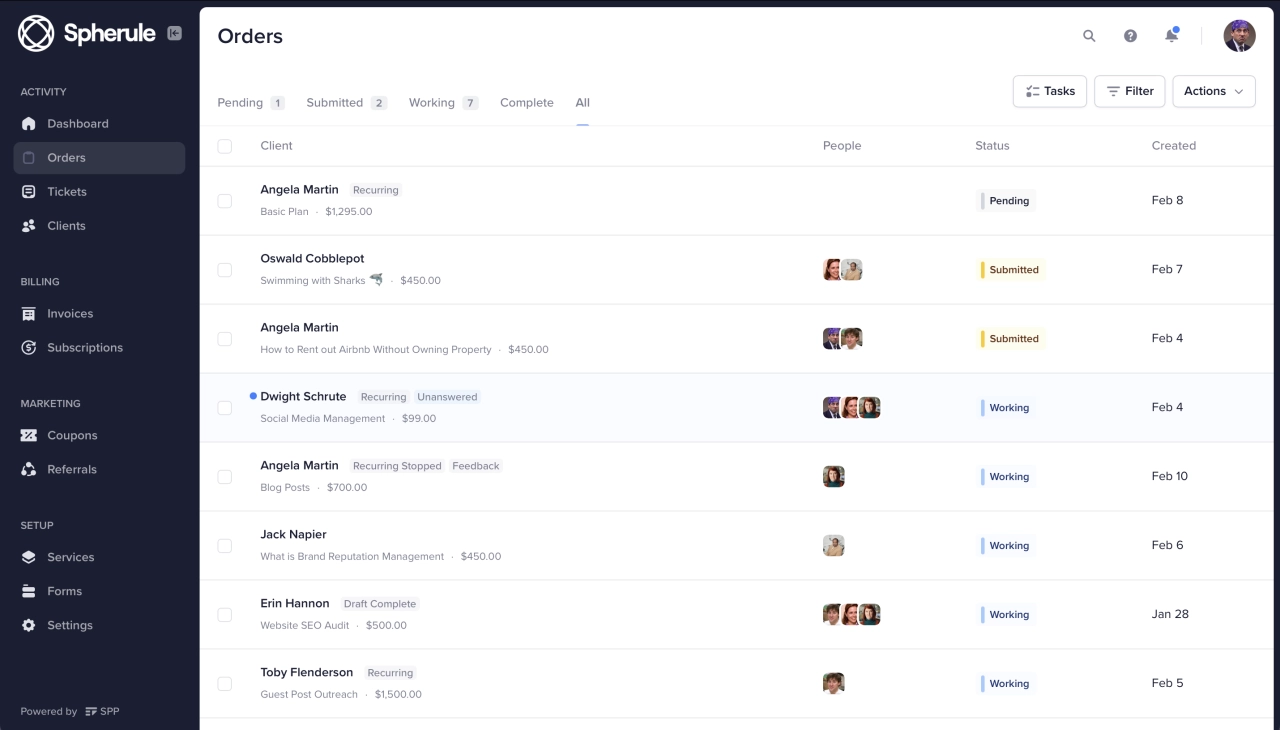- Creating content that positions your brand as an expert in the industry can increase trust and authority with potential customers.
- Consistency in content creation and publication is crucial for establishing credibility and maintaining engagement with your audience.
- Focusing on long-term strategies and creating evergreen content can lead to sustained traffic and leads over time.
Starting an agency involves many questions, but one stands out: how do you build authority?
Consider industry leaders like Neil Patel, Rand Fishkin, and Gary Vaynerchuk. Their influence comes from consistently sharing valuable, actionable content. By focusing on their audience’s needs, they’ve earned trust and credibility.
This strategy is known as authority content marketing. In today’s competitive landscape, creating authoritative content helps you stand out, earn trust, generate leads, and grow your agency.
This article explores what authority content is, why it matters, and how to leverage it to scale your agency.
What is authority content?
Let’s assume you’re just starting your SEO content agency and need the services of an SEO specialist to optimize your newly-designed website. During your research, you found an article where the writer showed he ranked websites on Google’s first page.
The next step would be to contact them to inquire how they can help you achieve the same result. Here’s why you would do that.
By sharing their knowledge, the writer proved they’re an SEO expert—enough to convince you they’re the right person for the job.
This is what authority content does for you. It’s the act of creating valuable, actionable content for your target audience to demonstrate your expertise and build authority in your niche. This helps you increase brand awareness, generate consistent leads and increase sales for your business.
Why build authoritative content?
In today’s saturated online space, everyone is trying to stand out. So, they churn out loads of low-quality content with the hope that it attracts their target audience.
But according to an Orbit Media survey, 46% of bloggers say getting traffic and attracting visitors is one of their top content marketing challenges.
The reason isn’t far-fetched.
Anyone can create content. But not everyone can create high-quality content that’s unique and in-depth. Most of what you come across online is generic, copycat content that provides little or no value to the readers.
Mediocre content will hurt your brand more than doing nothing at all.
 Joe Pulizzi,
Content Marketing Institute
Joe Pulizzi,
Content Marketing Institute
So, If you want to avoid harming your brand, you need to invest in authority content marketing for the following reasons.
1. Builds trust with your audience
The saying that people only buy from people they know, like, and trust holds water; nobody wants to spend their hard-earned money on inferior products. That’s why they do their due diligence before making a purchase.
But when starting a business, you lack the experience, pedigree, and network that older brands have. As such, people don’t know who you are and won’t trust you enough to patronize you. And to build your brand from the grown up, you need to be patient.
How do you overcome this hurdle? Creating authority content is a great way to start. By providing value-first content, potential clients will pay attention, engage and trust you which eventually translates to sales for your business.
Take Hubspot for example: they didn’t become the world’s leading CRM software overnight. They earned their reputation by consistently sharing free, educational content on inbound marketing and sales. This helped to build trust with their target audience and established them as an authority in the digital marketing space.
At Service Provider Pro, we also build our authority through content. Chris and I write about topics we know about from past and new experiences. We put our own spin on topics and don’t simply chase after keywords.
2. Increases audience engagement
What happens when you consistently create authoritative content? Your readers will keep coming back for more. Because you’ve proven to them that they can rely on you for valuable, helpful information.
Thus, creating and sharing high-quality content is a great way to increase engagement with your audience. As a result, you’ll get more traffic to your website, build an email list of loyal followers, generate quality leads, and drive sales for your agency.
Brian Dean, a renowned SEO expert is a typical example of someone who shares quality content. He’s the founder of Backlinko (now acquired by Semrush), a go-to blog for helpful, practical SEO and content marketing tips.

The amount of engagement he gets on each blog post is a testament to the level of quality it contains. For example, this article got almost 10,000 social media shares and over 400 comments.
3. Drive more conversions
The goal of any business is to convert leads into clients. I’m sure yours isn’t different. But you won’t get customers if you keep publishing bland content pieces. Even if you do, they’ll most likely be a few low-paying clients which aren’t sustainable for business growth.
As such investing in content that demonstrates your knowledge, and expertise is a no-brainer. They’ll bring in more sales for your business than thin paper content.
4. Open doors to more opportunities
When you consistently create great content, people see you as the go-to person for information or opinions about topics in your field. In other words, you become an authority, a thought leader, opening doors to new opportunities. These can range from brand partnerships, speaking engagements, collaborations with other industry thought leaders and influencer gigs.
Now that we’ve seen why authority content matters, here’s how you can achieve brand authority through content marketing.
How to build authority (with examples)
I’m sure you don’t need any more convincing that building authority is key to your success. Let me show you how to do that with a few examples.
1. Share your personal experience
With so much generic content being churned out daily, people pay more attention to unique, original stories that educate, entertain, and inspire them.
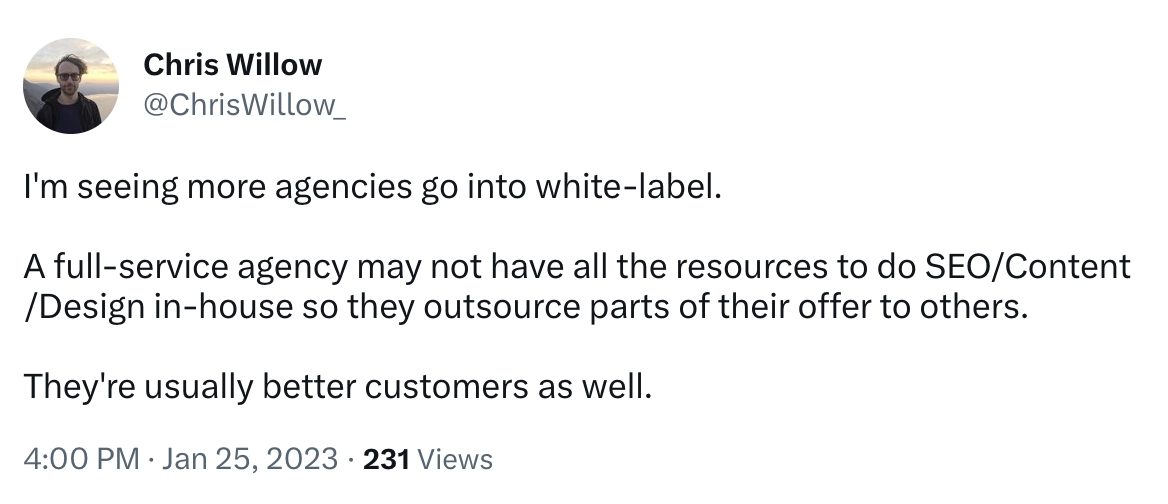
As such, if you’ve been in an industry for some years, you certainly would have made mistakes, experienced successes, and learned a few new tricks. What better way to demonstrate authority than to share all that knowledge and experience with your audience?
Doing this also helps to:
establish an emotional connection with your readers
give your content more depth and a different perspective
build trust and credibility for your brand
position you as an expert
increase engagement
generate leads and sales for your business
Gary Vaynerchuck uses this strategy when creating content. He shares his experience using stats, stories, screenshots, images, and relevant examples to make it more credible. This presentation shows how Gary does this to great effect.
2. Ask In-house experts
Apart from sharing your personal experiences as advised above, also leverage the knowledge of your in-house experts (employees, partners, board members, or freelancers).
Their experiences can add flair to your content and demonstrate your brand’s expertise. Featuring the quotes, video snippets, examples, or stories of experts within your company will take your content from average to exceptional.
You can also consider using text-to-speech software to create engaging and dynamic videos that will bring expert insights to life in a more accessible and interactive format.
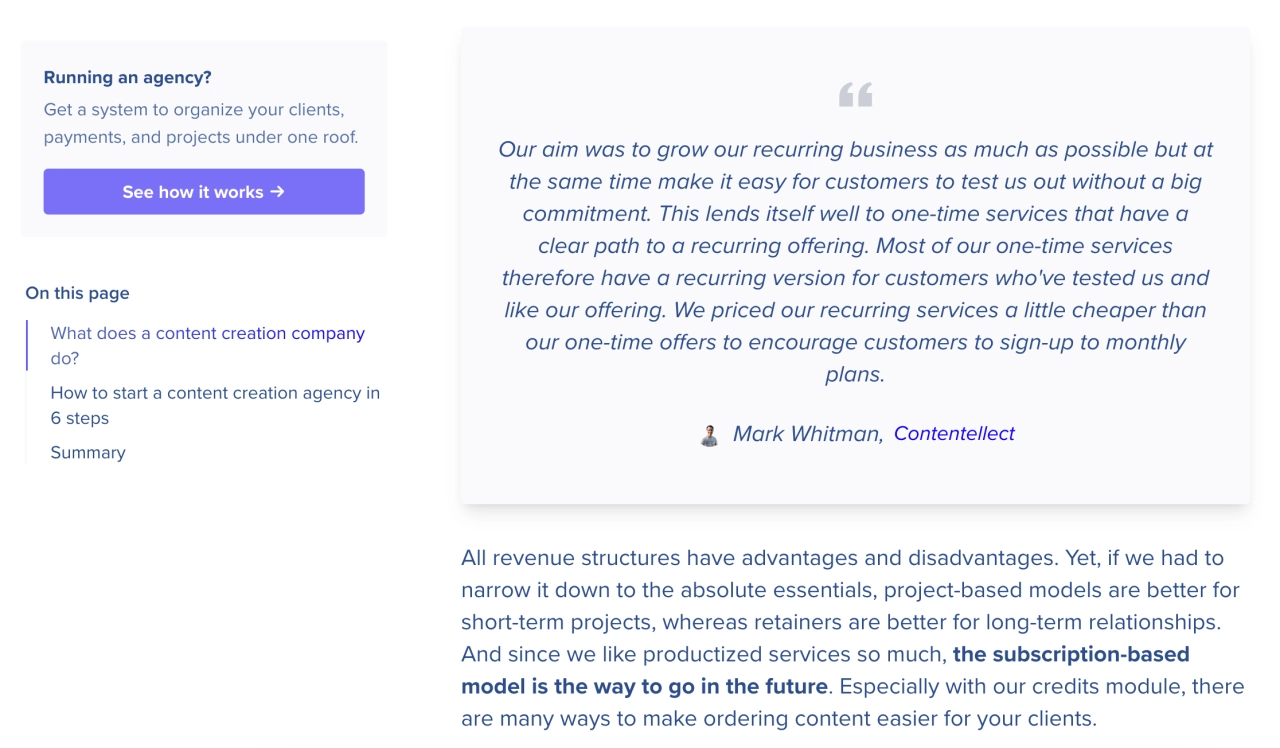
At SPP, we have a large pool of clients who are industry experts. Most of them are happy to provide quotes for our content.
3. Get input from external experts
When creating content, reach out to industry-recognized experts to get their opinion on a subject. In other words, be a journalist.
Adding experts’ unique insights to your content gives it more depth and credibility. It also showcases your brand as one that’s willing to go the extra mile to provide value to its readers.
How do you get input from external experts?
Here are some tips:
Reach them with targeted email marketing campaigns or via social media to ask their opinion on a topic.
Follow their conversations on social media platforms or in communities.
Listen to podcasts or interviews where they appear, and read their blogs.
Use sites like Qwoted, Featured, or Help a B2B writer to get quotes. But be sure to vet the answers before including them in your content.
Take Mrignayni Pandey for example. She used the Superpath Slack community to get expert opinions on an article she was writing. She also promised to add their quotes, do-follow links, and company profile as a reward—a great way to encourage more responses.
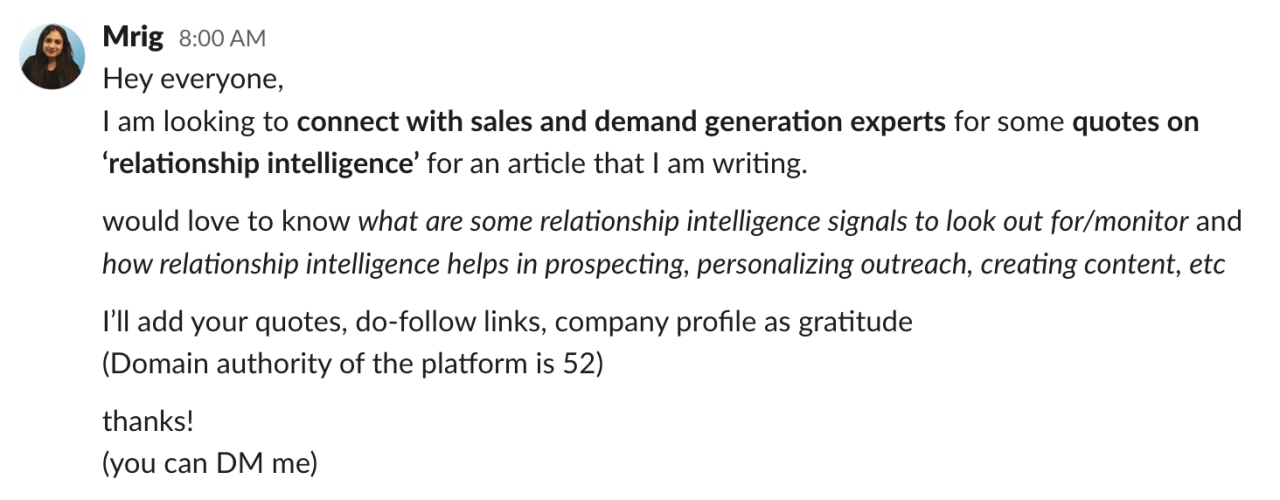
Here’s another example from Elise Dopson on Twitter.

4. Answer client questions
Another effective way to demonstrate your expertise is by answering client questions. You don’t have to look far to get them. Simply survey your existing clients, scour previous email conversations, or listen to old sales calls to identify frequently asked questions.
Clients appreciate people who take the time to create blog posts, videos, or podcasts that provide valuable answers to their questions.
But answering client questions shouldn’t be limited to existing clients. Creating content around your potential client’s questions is also a great way to demonstrate expertise.
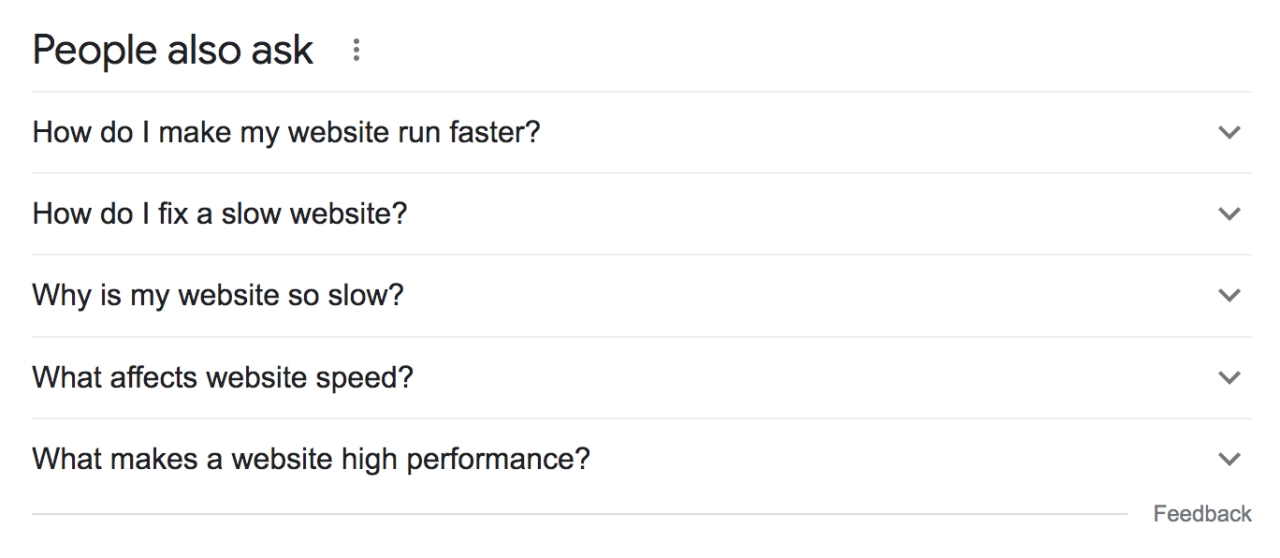
Social media platforms, Facebook groups, online forums like Quora or Reddit, and Answer the Public, are great places to find questions your audience is asking. Take your search further by using Google’s People also ask boxes, People also search for and Related searches at the bottom to see the questions people are asking.
5. Share case studies
Anyone can brag about the greatness of their product or service. But a more effective way is to show (not tell) them how your product is the best solution to their problems.
That’s where case studies come in. According to Hubspot’s 2022 state of marketing trends, 42% of top marketers say case studies are one of the top media formats they use in their content strategy.
And the reason is obvious: with case studies, you create relatable stories about how you used your knowledge and experience to help clients overcome their challenges. The result? You’ll gain their trust, build authority, generate qualified leads, and drive sales for your agency.
At Servicer Provider Pro, we’ve created case studies that showcase how we are the ideal solution for a variety of agencies, from SEO to link building and social media management. Every case study is conducted as an interview, published to YouTube, then distributed on social media, embedded in blog posts, and used as testimonials on our website.
6. Create original reports
As Clive Humby rightly said, “Data is the new oil.” That’s why people are always looking for fresh, unique, and relevant data on a subject matter to make informed decisions. Researching and creating original reports is a great way to give them what they want.
It shows readers you know a topic like the back of your hand which positions you as a brand authority. Also, making the report accessible to the public earns you backlinks, showcasing the link building benefits and thereby increasing traffic to your website.
Original reports can be a white paper, industry study, survey, or infographic. To get data for your report, collaborate with your industry experts or survey your existing clients.
An example is the aforementioned Hubspot 2022 state of marketing report I linked to. Of course, resources like that take a lot of time to create. If you don’t have in-house resources, you can make use of SEO content writing services to create reports, case studies, and more.
Authoritative content in the age of AI
Now that you’re aware of how to build authority, there’s one more thing that poses both challenges but also opportunities: AI. Let me explain how you can make use of it with your authoritative content building.
AI’s role in content creation
AI can generate content at scale, providing initial drafts and suggestions that save time and effort. Tools like Penfriend, ChatGPT, or Llama can craft articles, social media posts, and even personalized emails, allowing creators to focus on strategy and refinement.
Maintaining content authority
AI-generated content can sometimes lack the authentic voice and unique insights that build trust. Over-reliance on AI may dilute the human touch essential for authoritative content. Another challenge is that AI models occasionally produce inaccuracies or misinterpret context, risking the spread of misinformation. You’ll have to make sure that the facts presented are indeed accurate.
Opportunities for content authority
Luckily, the opportunities of AI outweigh the challenges:
Enhanced research: AI can quickly analyze vast amounts of data, providing insights and trends that enrich content. This capability enables creators to produce more informed and relevant pieces.
Personalization: AI can tailor content to individual reader preferences, enhancing engagement and relevance. This personalized approach can strengthen the connection with the audience, fostering trust and authority.
Consistency: AI tools can help maintain a consistent brand voice across multiple platforms, ensuring that content remains cohesive and recognizable, reinforcing authority over time.

By thoughtfully utilizing AI, content creators can enhance their work, reaching wider audiences with high-quality, authoritative content. Balancing AI assistance with human oversight ensures that the content remains accurate, authentic, and impactful.
SEO and authoritative content
Besides AI, SEO is and will remain and important key aspect of your authority content, especially within the EEAT (Experience, Expertise, Authoritativeness, and Trustworthiness) framework.
EEAT stands for:
Experience: Demonstrate practical knowledge and real-world application of your topic. Share case studies and examples to showcase your hands-on expertise.
Expertise: Establish yourself as a thought leader by publishing in-depth, well-researched content. Collaborate with industry experts to enhance credibility.
Authoritativeness: Build authority through consistent, high-quality content that addresses industry trends and challenges. Earn backlinks from reputable sources to boost your domain authority.
Trustworthiness: Ensure your content is accurate, transparent, and reliable. Include citations, data sources, and author bios to build trust with your audience.
High-quality content remains the backbone of successful search engine optimization. It attracts organic traffic, encourages engagement, and earns valuable backlinks. By focusing on EEAT principles and integrating strategic SEO techniques, you can enhance your search visibility and establish your brand as an authority in your industry.
Authority content marketing FAQ
What is authority in content marketing?
Authority in content marketing is the act of demonstrating expertise and credibility in your field. You do this by creating high-quality content that provides unique, actionable information to your target audience for free. This helps to establish trust, generate leads and increase conversions for your business.
Why build authoritative content?
Building authoritative content helps agencies establish trust with prospects, increase audience engagement, drive more conversions, and open doors to new opportunities like partnerships and speaking engagements. It positions your agency as a trusted expert rather than just another service provider, leading to higher-quality leads and premium pricing opportunities.
How can brand awareness be increased through content?
You can increase brand awareness by creating authoritative content that resonates with your target audience. People who find it helpful are more likely to engage, and share with others allowing it to reach more people. This way, you create more awareness for your brand.
How do you build authority with content?
It starts by creating content that demonstrates your knowledge and expertise. This content should be tailored to your target audience and focus on topics relevant to your industry. Additionally, you can tap into your personal experience, get input from in-house and external experts, and create original reports or case studies to demonstrate your know-how.
How do you improve content authority?
To improve your content authority, it’s important to focus on quality over quantity. You do this by ensuring your content is well-researched, well-written, contains credible sources, statistics, and relatable examples. Update your content regularly with the latest trends in your industry.
How does authoritative content help agencies attract better clients?
Authoritative content attracts higher-quality prospects who are already educated about your expertise before they contact you. These prospects typically have larger budgets, clearer goals, and are more willing to invest in premium services because they understand your value proposition through your content.
What types of content establish authority fastest for agencies?
Case studies with specific results, industry research and data analysis, detailed process breakdowns, tool comparisons based on real usage, and problem-solving guides that address common client challenges establish authority most quickly for marketing agencies.
How long does it take to build content authority as a marketing agency?
Building meaningful content authority typically takes 6-12 months of consistent publishing. However, agencies can see initial results within 3 months by focusing on high-value topics their ideal clients actively search for, backed by real case studies and original insights.
Use authority building content to your advantage
Creating great content is one of the most effective marketing strategies to increase brand awareness, generate qualified leads and drive sales. As such, it’s crucial to the success of any business.
But creating lazy, generic content won’t cut it in today’s digital-first world. To grab your audience’s attention and convince them to become loyal followers, you have to create high-quality content that establishes trust and demonstrates your authority. Only then will you reap the rewards of your effort.












